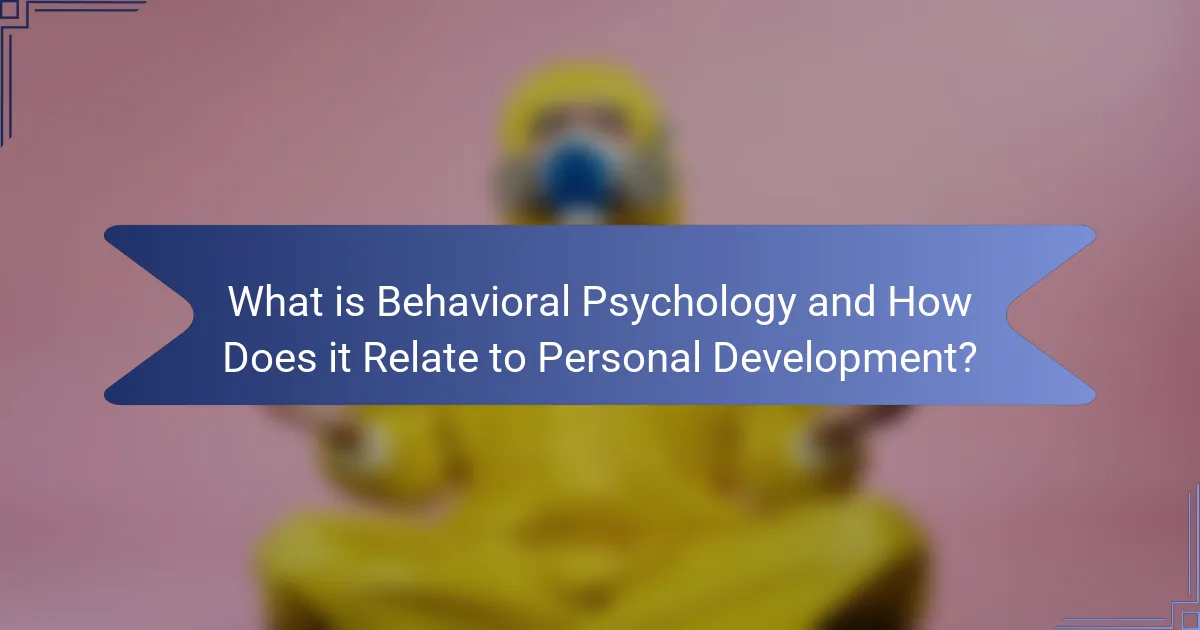Behavioral psychology offers powerful strategies for personal development by enhancing habits, motivation, and self-improvement. This approach helps individuals identify behavioral triggers and implement effective coping mechanisms. Key techniques include setting measurable goals, utilising positive reinforcement, and creating supportive environments for lasting change. By applying these principles, individuals can reshape their mindsets and achieve their personal growth objectives.

What is Behavioral Psychology and How Does it Relate to Personal Development?
Behavioral psychology focuses on understanding and modifying behaviour, directly impacting personal development. It provides strategies to unlock habits, enhance motivation, and foster self-improvement.
By analysing behaviour patterns, individuals can identify triggers and develop effective coping mechanisms. Techniques such as reinforcement and behaviour modification empower people to create lasting change. For example, setting small, achievable goals can enhance motivation and lead to significant personal growth.
This approach emphasises the importance of self-awareness in recognising habits that hinder progress. By applying behavioral principles, individuals can reshape their mindset and achieve their personal development objectives.
In summary, behavioral psychology serves as a powerful tool for personal development, enabling individuals to transform their lives through understanding and altering their behaviours.
What are the key principles of Behavioral Psychology?
The key principles of behavioral psychology focus on understanding and modifying behaviour through observable actions and environmental influences. These principles include reinforcement, punishment, and conditioning, which shape habits and motivation. Reinforcement increases desired behaviours, while punishment decreases undesired ones. Conditioning, both classical and operant, establishes associations between stimuli and responses, facilitating personal development strategies. By applying these principles, individuals can effectively unlock habits and enhance self-improvement efforts.
How do habits influence personal development?
Habits significantly influence personal development by shaping behaviours and motivating actions. They create routines that foster consistency, leading to improved skills and self-discipline. Positive habits can enhance productivity, while negative ones may hinder progress. Understanding the psychology behind habit formation can unlock strategies for effective self-improvement. For example, the habit loop—cue, routine, reward—illustrates how habits are formed and maintained. By modifying cues or rewards, individuals can change their routines, fostering personal growth.
What are the stages of habit formation?
Habit formation occurs in four stages: cue, craving, response, and reward. These stages create a loop that reinforces behaviour.
1. Cue: An external or internal trigger that initiates the habit.
2. Craving: The desire or motivation to perform the habit.
3. Response: The actual behaviour or action taken in response to the cue.
4. Reward: The positive outcome that reinforces the habit, making it more likely to be repeated.
Understanding these stages can enhance personal development strategies by enabling individuals to identify and modify their habits effectively.
How can behavioral reinforcement shape habits?
Behavioral reinforcement effectively shapes habits by creating consistent rewards for desired behaviours. This process strengthens the association between actions and positive outcomes, making it easier to adopt and maintain new habits. For instance, consistently rewarding yourself after completing a task can enhance motivation and reinforce the habit. Research indicates that positive reinforcement significantly increases the likelihood of repeating behaviours, thereby facilitating long-term habit formation.
What role does motivation play in personal growth?
Motivation is crucial for personal growth as it drives individuals to pursue goals and develop new skills. It influences behaviour, enhances persistence, and fosters resilience during challenges. Research shows that intrinsic motivation, which stems from personal satisfaction, leads to more sustainable growth compared to extrinsic motivation. Setting clear, achievable goals can significantly enhance motivation levels, creating a positive feedback loop that promotes continuous self-improvement.
What are intrinsic and extrinsic motivations?
Intrinsic motivation drives behaviour from internal satisfaction, while extrinsic motivation relies on external rewards. Understanding these motivations enhances personal development strategies. Intrinsic motivation fosters long-term engagement, promoting habits that align with personal values. In contrast, extrinsic motivation can effectively initiate change but may not sustain it. Balancing both types can optimise self-improvement efforts.
How can understanding motivation enhance self-improvement?
Understanding motivation significantly enhances self-improvement by providing clarity on personal goals and driving behaviour change. Motivation acts as a catalyst, influencing the consistency of habits and the pursuit of objectives.
Behavioral psychology emphasises intrinsic motivation, which fosters deeper engagement and persistence. For example, individuals motivated by personal growth rather than external rewards tend to achieve sustainable change.
Recognising unique motivators allows for tailored self-improvement strategies, enhancing effectiveness. Setting specific, measurable goals aligned with personal values can amplify motivation.
As a result, understanding motivation equips individuals with the tools to overcome obstacles and maintain focus on their self-improvement journey.

What are the universal strategies for applying Behavioral Psychology?
To effectively apply Behavioral Psychology in personal development, focus on strategies that enhance habits, motivation, and self-improvement. Key strategies include setting specific goals, utilising positive reinforcement, and creating an environment conducive to change.
1. Establish clear, measurable goals to guide behaviour.
2. Use rewards to reinforce positive actions and sustain motivation.
3. Implement habit-stacking by linking new habits to existing ones for easier adoption.
4. Monitor progress regularly to maintain accountability and adjust strategies as needed.
These strategies leverage core principles of Behavioral Psychology to facilitate lasting personal growth.
How can behaviour modification techniques improve habits?
Behaviour modification techniques can significantly enhance habits by promoting positive behaviour changes. These techniques, rooted in behavioral psychology, leverage reinforcement, goal setting, and self-monitoring to foster lasting improvements. For example, using positive reinforcement encourages individuals to repeat desired behaviours, while self-monitoring helps track progress and maintain motivation. Research shows that consistent application of these techniques can lead to a 25% increase in habit formation success rates. By understanding the underlying principles, individuals can effectively unlock their potential for self-improvement.
What are the most effective behaviour modification techniques?
The most effective behaviour modification techniques include positive reinforcement, negative reinforcement, punishment, and extinction. These techniques influence habit formation and motivation in personal development.
Positive reinforcement encourages desired behaviours by rewarding them, increasing the likelihood of repetition. Negative reinforcement involves removing an unpleasant stimulus to strengthen behaviour. Punishment, while less effective long-term, can deter unwanted actions. Extinction eliminates reinforcement, leading to a decrease in behaviour.
Each technique can be tailored to individual goals, making them unique attributes in behavioral psychology. Implementing these strategies effectively can significantly enhance self-improvement efforts.
What are the common challenges in changing behaviour?
Common challenges in changing behaviour include lack of motivation, ingrained habits, and environmental triggers. Resistance to change often stems from comfort with existing routines. Emotional factors, such as fear of failure, can hinder progress. Additionally, setting unrealistic goals may lead to frustration and abandonment of efforts. Understanding these barriers is crucial for effective self-improvement strategies.

What unique attributes of Behavioral Psychology support self-improvement?
Behavioral psychology uniquely supports self-improvement by focusing on observable behaviours and the environment’s influence on them. This approach emphasises habit formation, motivation, and reinforcement strategies.
One unique attribute is the concept of operant conditioning, which highlights how rewards and punishments shape behaviour. For example, positive reinforcement can enhance motivation to develop new habits. Another unique aspect is the emphasis on setting specific, measurable goals that facilitate tracking progress and maintaining motivation.
Behavioral psychology also promotes the use of cognitive restructuring, which helps individuals identify and change negative thought patterns that hinder self-improvement. This method encourages a proactive mindset, fostering resilience and adaptability.
Lastly, the application of behavioral interventions, such as nudges, can effectively alter environments to support desired behaviours, making self-improvement more achievable. These unique attributes collectively empower individuals to make lasting changes in their lives.
How do cognitive-behavioral techniques enhance personal development?
Cognitive-behavioral techniques enhance personal development by fostering self-awareness and promoting positive behaviour change. These techniques help individuals identify negative thought patterns and replace them with constructive alternatives. For example, cognitive restructuring allows people to challenge irrational beliefs, leading to increased motivation and improved self-esteem. Additionally, goal-setting strategies within cognitive-behavioral frameworks provide clear pathways for personal growth. By breaking down larger objectives into manageable tasks, individuals can track progress and celebrate small victories, reinforcing their commitment to self-improvement.
What are the steps in cognitive restructuring?
Cognitive restructuring involves several key steps to alter negative thought patterns. First, identify negative thoughts. Next, challenge these thoughts by examining evidence for and against them. Then, replace negative thoughts with more balanced, rational ones. Finally, practice these new thoughts consistently to reinforce positive thinking.
How can goal-setting principles be applied effectively?
Effective goal-setting principles enhance motivation and foster self-improvement. Start by defining specific, measurable, achievable, relevant, and time-bound (SMART) goals. This clarity boosts focus and commitment. Regularly review progress to adjust strategies and maintain motivation. Incorporate accountability through support systems, ensuring sustained engagement. Celebrate milestones to reinforce positive behaviour and encourage further effort.
What is the SMART criteria for goal setting?
The SMART criteria for goal setting is a framework that ensures goals are Specific, Measurable, Achievable, Relevant, and Time-bound. This method enhances clarity and focus in personal development. Each element plays a crucial role: Specific goals define clear outcomes, Measurable criteria track progress, Achievable ensures realism, Relevant aligns with broader objectives, and Time-bound sets deadlines for accountability. Implementing SMART goals can significantly boost motivation and self-improvement strategies.

What rare insights can be gained from Behavioral Psychology?
Behavioral psychology offers rare insights into the mechanisms of habit formation and motivation. These insights can help individuals understand their behavioural triggers, leading to more effective self-improvement strategies. For instance, recognising the impact of environmental cues on decision-making allows for the design of supportive environments that foster positive habits. Additionally, understanding intrinsic versus extrinsic motivation can guide personal development efforts, ensuring that individuals pursue goals that resonate deeply with their values. This knowledge enables tailored approaches to habit change, enhancing the likelihood of sustained personal growth.
How does the concept of self-efficacy impact personal development?
Self-efficacy significantly influences personal development by enhancing motivation and persistence. Individuals with high self-efficacy set challenging goals and remain committed, leading to greater achievement. They view challenges as opportunities, fostering resilience. Research shows that self-efficacy correlates with improved performance across various domains, including education and career. This psychological construct empowers individuals to adopt proactive behaviours, ultimately driving self-improvement and habit formation.
What are the sources of self-efficacy?
Self-efficacy sources include mastery experiences, vicarious experiences, social persuasion, and emotional states. Mastery experiences involve successfully completing tasks, boosting confidence. Vicarious experiences occur when observing others succeed, enhancing belief in one’s abilities. Social persuasion involves encouragement from others, reinforcing self-belief. Emotional states refer to how feelings influence confidence; positive emotions enhance self-efficacy, while negative emotions can undermine it.
What are the implications of behavioral economics in personal growth?
Behavioral economics significantly influences personal growth by enhancing understanding of decision-making processes. It reveals how cognitive biases affect habits and motivation, leading to more effective self-improvement strategies. For instance, the concept of “nudging” encourages positive behaviour changes through subtle adjustments in environment and choice architecture. This approach can help individuals develop better habits by making beneficial options more accessible. Additionally, recognising the impact of social influences and rewards can motivate sustained personal development. By applying these principles, individuals can unlock their potential and achieve lasting self-improvement.

What actionable strategies can be implemented for self-improvement?
To implement actionable strategies for self-improvement, focus on habit formation, motivation enhancement, and behavioural adjustments. Start by setting clear, achievable goals. Utilise techniques like the SMART criteria to ensure goals are specific, measurable, attainable, relevant, and time-bound.
Incorporate positive reinforcement to build new habits. Reward yourself for small victories to maintain motivation. Tracking progress visually can also reinforce commitment.
Engage in regular self-reflection to assess your growth and identify areas needing improvement. Journaling or discussing your progress with a mentor can provide valuable insights.
Lastly, adopt a growth mindset. Embrace challenges as opportunities for learning and view setbacks as temporary obstacles. This perspective fosters resilience and encourages continuous development.
What are the best practices for maintaining motivation?
To maintain motivation, establish clear goals, track progress, and create a supportive environment. Consistency is key; develop daily habits that reinforce your objectives. Incorporate positive reinforcement to celebrate achievements, no matter how small. Engaging with a community or accountability partner enhances commitment and provides encouragement.
What common mistakes should be avoided in personal development?
To enhance personal development effectively, avoid these common mistakes: neglecting self-reflection, setting unrealistic goals, ignoring emotional triggers, and failing to celebrate progress. Each mistake can hinder motivation and impede growth. Self-reflection helps identify areas for improvement, while realistic goals foster achievable progress. Recognising emotional triggers aids in managing responses, and celebrating small wins reinforces positive behaviour.
How can accountability enhance the effectiveness of behavioral strategies?
Accountability significantly enhances the effectiveness of behavioral strategies by fostering commitment and consistency. When individuals are accountable, they are more likely to adhere to their goals and follow through on their plans. This accountability can come from external sources, such as coaches or peers, or from internal commitments, such as personal values. Research shows that accountability increases motivation and self-discipline, leading to improved habit formation and sustained behaviour change. Furthermore, tracking progress through accountability measures allows for timely adjustments to strategies, optimising personal development outcomes.